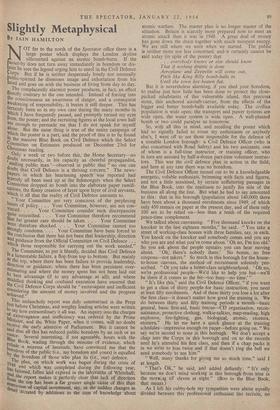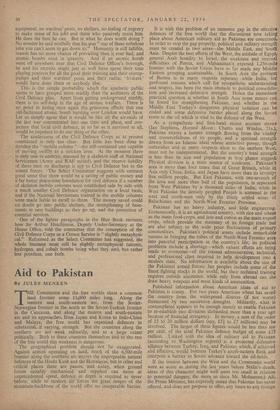Slightly Metaphysical
0Y IAIN HAMILTON OT far to the north of the Spectator office there is a large poster which displays the London skyline silhouetted against an atomic bomb-burst. If the tasser-by does not turn away immediately in boredom or dis- , aste he sees the legend urging him to enrol in. the Civil Defence ores. But if he is neither desperately lonely nor unusually ublic-spirited he dismisses image and exhortation from his blind and goes on with the business of living from day to day. , . The complacently alarmist poster produces, in fact, an effect Iltrectly contrary to the one intended. Instead of forcing into the consciousness an awareness of danger, and a consequent ‘twakening of responsibility, it buries it still deeper. This has certainly been so in my own case during the many months in Which I have frequently passed and promptly turned my eyes trout, the poster; and the recruiting figures at the local town hall re enough to persuade me that I do not speak for myself alone. But the same thing is true of the entire campaign of Which the poster is a part, and the proof of this is to be found La the massive Blue Book on Civil Defence which the Select Christmas on Estimates produced on December 23rd for klristmas reading. . Only a week or two before this, the Home Secretary—no doubt necessarily, in his capacity as cheerful propagandist, stalling public man '—observed in public that ' no one can doubt that Civil Defence is a thriving concern." The news- papers in which his heartening speech was reported had scarcely all been used up at the fishmongers when the Select Committee dropped its bomb into the elaborate paper ramifi- cations, the flimsy creation of layer upon layer of civil servants, which is all that the reality of Civil Defence amounts to. " Your Committee are very conscious of the perplexing Issues of policy. . . . Your Committee, however, are not con-, vinced. . . . Your COmmittee consider such discrepancies quite unjustified. . . . Your Committee therefore recommend tllat far greater care should be taken. . . . Your Committee Were therefore shocked. . . . Your Committee cannot oo the condemn. . . . Your Committee have been forced to ul _e conclusion that there has not been that leadership, direction ' and guidance from the Official Committee on Civil Defence . . . which those responsible for carrying out the work needed." , The Committee, to put it bluntly, decided that Civil Defence is a lamentable failure, a flop from top to bottom. But mainly eit the top, where there has been failure to provide leadership, direction or guidance; where there has been persistent over- !stirnating and where the money spent has not been laid out to best advantage (if to any advantage at all); and where muddled thinking and confused execution have ensured that the Civil Defence Corps should be " extravagant and inefficient e , onsidering the amount of money involved and the progress achieved." This melancholy report was duly summarised in the Prep Just before Christmas, and weighty leading articles were written to say how extraordinary it all was. An inquiry into the charges .11, extravagance and inefficiency was ordered by the Prime _'llaister, and the White Paper, when it comes, will no doubt receive the early attention of Parliament. But it cannot be ,said that all this has reduced public boredom by an inch- or an tree. Several interesting, if not agreeable, hours with the exuLe Book, wading through the minutes of evidence, which .i_ortale a miasma of lassitude, have convinced me that the .b° redom of the public (i.e., my boredom and yours) is equalled 3'the boredom of those who plan its (i.e., our) defence. 1948e plan, on -which work was begun during the crisis of ..;,. and which was completed during the following year, .":S, faltered, fallen and expired in the labyrinths of Whitehall; .#,I' the report makes it ,perfectly clear that lack of direction 4,71111 the top has been a far greater single cause of this than atomic warfare. The master plan is no longer master of the situation. Britain is scarcely more prepared now to meet an atomic attack than it was in 1948. A great deal of money has gone down the drain together with much misspent energy. We are still where we were when we started. The public is neither more nor less concerned, and•it certainly cannot be said today (in spite of the poster) that . . . everybody knows or else should know
That if nothing drastic is done Aeroplane and Zeppelin will come out, Pitch like King Billy bomb-balls in Until the town lies beaten flat.
But it is nevertheless alarming, if you shed your boredom, to realise just how little has been done to protect the close- packed inhabitants of this vulnerable island, this precious stone, this anchored aircraft-carrier, from the effects of the bigger and better bomb-balls available today. The civilian population is wide open; the transport and power systems are wide open, the water system is wide open. A well-planted bomb or two could paralyse us tomorrow.
So, with all this in mind, and recalling the poster which had so signally failed to rouse my enthusiasm or anybody else's, I went off to see those responsible for the defence of a sizeable London borough: a Civil befence Officer (who is also concerned with Road Safety) and his two assistants, one of whom is a full-time instructor, or training officer, who in turn are assisted by half-a-dozen part-time volunteer instruc- tors. This was the civil defence plan in action in the field; and here at any rate there was no boredom.
The Civil Defence Officer turned out to be a knowledgeable energetic, voluble enthusiast, brimming with facts and figures, and not a little sensitised, by certain unflattering passages in the Blue Book, into the readiness to justify his side of the business all along the line. But what he had to say amounted to this : that in his borough (population about 140,000) there have been about a thousand enrolments since 1949, of which only 450 remain on paper at the present day, and of them only 100 are to be relied on—less than a tenth of the required peace-time complement. We talked about canvassing. " Five thousand knocks on the knocker in the last eighteen months," he said. " You take a street of working-class houses with three families, say, in each. You knock on the knocker and somebody comes and you say who you are and what you've come about. ' Oh no, I'm too old' So you ask about the people upstairs you can hear moving about. Oh; there's nobody there.' No bonus, no free coupons—not takers." So much in this borough for the house- to-house canvass, the method of recruitment solemnly pre- scribed. " Or you take a better-class neighbourhood. Oh no, we're professional people—We'd like to help you but—we'll be there if it comes to the bit—too busy—no time.' " " It's like this," said the Civil Defence Officer, " if you want to get a class of thirty people for basic instruction, you need at least fifty enrolments. And of these thirty you lose a lot after the first class—it doesn't matter how good the training is. We do between thirty and fifty training periods a month—basic general, basic first-aid, basic rescue—CD organisation, recon- naissance, protective clothing, walkie-talkies, map-reading, high explosive, fire-fighting, gas, biological, atomic, etcetera, etcetera," He let me have a quick glance at the training schedules—impressive enough on pappr—before going on. " We say we're second to none in this borbugh. We don't accept a chap into the Corps in this borough and on to the records until he's attended his first class, and then if a chap packs it in we write to him twice and if that doesn't ring the bell we send somebody to see him."
" Well, many thanks for giving me so much time," said I at length.
" That's OK," he said, and added defiantly: " It's only because we don't mind working in this borough from nine in the morni.tg tit' eleven at night." (Boo to the Blue Book, that meant.) equipment, no wardens' posts, no shelters, no feeling of urgency to make sense of his job) and those who passively resist him. He does the best he can. But is what he does worth doing ? No wonder he said wistfully that his was " one of these nebulous jobs you can't seem to get down to." Humanity is still fallible. reason has no more chance of prevailing than it ever had, and atomic bombs exist in quantity. And if an atomic bomb went off anywhere near that Civil Defence Officer's borough, he and his recruits might just as well have spent their time playing pontoon for all the good their training and their stirrup- pumps and their wardens' posts and their radiac friskers' would have done them or anybody else.
This is the simple probability which the apathetic public seems to have grasped more readily than the architects of the Civil Defence plan. Apart from getting underground nimbly, there is no self-help in the age of atomic warfare. There is no point in listing once again the gruesome effects that one old-fashioned atomic bomb bursting over London would have. Let us simply agree that it would be like all the air-raids of the last war concentrated into one time and place, and con- jecture that local civil defence, in so far as it survived at all, would be impotent to do one thing or the other. The aimlessness of the Civil Defence Corps as atpresent constituted is only too clear. But little has been done to develop the " mobile column "--the self-contained unit capable of moving swiftly to a stricken area. At the moment there is only one in embryo, manned by a skeleton staff of National Servicemen (Army and RAF mixed), and the reserve liability of these men on discharge is not to Civil Defence but to the armed forces. The Select Committee suggests with eminent good sense that there would be a saving of public money and a far better peace-time foundation for civil defence if a number of skeleton mobile columns were established side by side with a much smaller Civil Defence organisation on a local basis, and if the National Servicemen trained in the mobile columns were made liable to recall to them. The money saved could no doubt go into public shelters, the strengthening of base- ments in new buildings as they go up, and the protection of essential services.
One of the lighter paragraphs in the Blue Book recounts how Sir Arthur Hutchinson, Deputy Under-Secretary at the Home Office, told the committee that the conception of the Civil Defence Corps as a Crown Service is "slightly metaphysi- cal." Reformed as the Select Committee has suggested, the whole business must still be slightly metaphysical (atomic, hydrogen, and cobalt bombs being what they are), but rather less pointless, one feels.



































 Previous page
Previous page